Over the past week, we have released a short series of podcast episodes on the occasion of international Women's Day 2023. There, women who are involved with science or the exploration of the ocean have shared their experiences and their messages for the future. On this occasion, we had also collected questions from the younger generation, and asked our guests to answer some of them. If your questions has not been answered, rest assured that we are working on it, keep you eyes open for a little something in the making to be revealed soon! Below is a little summary of our guests' messages and some of their favourite pictures they shared.
Marta Musso, marine biologist and illustrator, Italy.

"I'm a marine biologist and illustrator. I'm a freelancer, so I get to choose what kind of job I'm going to do. Most times I'm creating illustrated material for science or carrying out workshops on plankton with kids and adults. Sometimes I also get to share my work in conferences and other events, and some other times I get involved in organising and planning new projects. All to do with the ocean, of course.
I wanted to be a scientist because I wanted to know more about the creatures that live around us and how the water-land ecosystem works. Growing up, I had two role models that influenced my decision to work in science Konrad Lorenz, an Austrian ethologist, and Jane Goodall. They both studied animal behaviour and fully immersed themselves in understanding animal social behaviour and to better understand nature, but also us and their passion and commitment was just contagious. My favourite part of this job is that I get to share with people what I love the most, the ocean, and I get to be a kid every day learning more and more about the ocean and how it works and what creatures lives
What advice would I give to my younger self? Keep doing what you're doing. Uh, you'll get there and stop stressing out so much. No matter what choice you make, you're gonna get there somehow. And, you know, just being determined and passionate about what you love and never stop exploring your roots is probably going to take you to the way you wanna go. So, yes, never give up and always be passionate."
Sandy Thomalla, Senior scientist,Southern Ocean Carbon and Climate Observatory (SOCCO), CSIR, South Africa.

"I am the research group leader for the Southern Ocean Carbon and Climate Observatory (SOCCO) at the CSIR in Cape Town, South Africa. We are trying to better understand the role that the Southern Ocean plays in driving climate. And it's really important because the Southern Ocean is disproportionately more important when it comes to buffering the impacts of climate change as it takes up 75% of the heat that is being generated by the excess anthropogenic CO2 in the atmosphere.
Why did I choose to become a scientist? Well, I've only ever wanted to be two things in my life. First, when I was very young, I wanted to be a pilot. I And at that stage, women weren't allowed to be pilots. But it wasn't long after that I decided I actually wanted to be a marine biologist. In our honours year, there was an opportunity if I did oceanography to go to Marion Island, which is an island in the sub Antarctic that has albatrosses and penguins and cape fur seals. I'm a biological oceanographer, so I sit at the crossroads between physics and biology, and I study single celled plants called phytoplankton and how they take up CO2 through the process of photosynthesis and then exporting it to the deep ocean.
What is my favourite thing about the work that I do? Without a doubt, I'd say my favourite is being able to go to sea; to the Southern Ocean in particular, which is where I work now. But also in my PhD. I crossed the equator, got to see water blue within the blues you can possibly imagine, and flying fish popping out. And in the southern ocean now I see ice covered seas and icebergs and the most incredible sunsets you can imagine. Not to mention the huge storms and big waves that are just incredible.
Advice for a younger version of myself. Oh, without a doubt, it would be to code to learn how to code, Python programming or any computing language. I don't think it matters what kind of scientist you're going to end up being, whether you work in a laboratory or go to see collecting samples. Ultimately the future lies in large datasets from autonomous underwater robots, from remote sensing satellites. If you're not able to code, you're going to be hindered and you aren't going to be the best version of yourself."
Rutuja Bansod, IMBRSea student at the University of Ghent in Belgium.

"I am currently doing my second masters, with Ghent University for the Erasmus MUNDUS programme IMBRSea. I'm really excited because my project is on ocean literacy, and ocean literacy is something that I recently discovered.
My initial dream was being a writer and I really, really wanted to do literature after I did my high school. There was one point where I got into the science stream and I also got into the literature, and then I was at a standpoint. But then being an Indian person and coming from an Indian background, my mom was like, you have to secure your future. So that's why I went into science stream. But I kept reading on the side because I love reading. I decided not to do academic research, but doing something concrete that would make sure that whatever I'm doing impacts the communities as well."
Flora Vincent, Group leader, EMBL, Germany
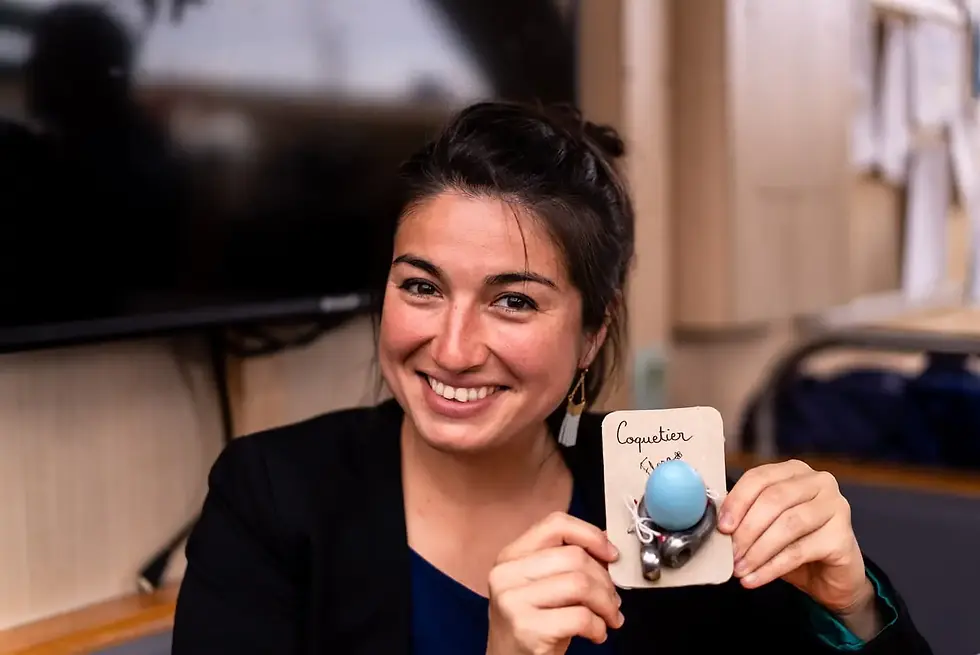
"I'm a marine microbiologist, meaning that I work on microbes that live in the ocean and that are invisible to the naked eye. And in particular, I try to understand how microbes really interact with each other. How those interactions can affect their survival, but also our ecosystem. I particularly focus on diatoms. These are tiny microbes that can conduct photosynthesis. This means that they can use carbon dioxide, CO2 to produce oxygen, and this oxygen is of course, super relevant for life in the ocean.
I chose to become a scientist mostly thanks to my curiosity for how life works. I felt science was one of the rare places where asking questions, being curious and having time to think about problems was actually valued, and you get to work with really fantastic people, which is what makes my daily life very enjoyable.
I think right now my favourite thing about work is just being with people in my lab, talking about their scientific experiments and their results, seeing them happy and growing as marine microbiologists. This is what brings me the biggest satisfaction.
If I had to give advice to a younger version of myself, it would really be to trust my gut feeling, to go for what excites me the most, and also to keep doors open to the unexpected. "
Shamwari Anseeuw, IMBRSea student at the University of Ghent in Belgium

"I am in my last year of the IMBRSea Master Program. It's the International Master of Science and Marine Biological Resources. I am from the Dominican Republic, born and raised in the Dominican Republic, but we moved to Belgium so I could follow my bachelor's in Europe.
I chose to become a scientist because I've always been drawn to nature. Growing up in the Dominican Republic, I was very in tune with my environment, and I also have to thank my parents for that because from a very young age, they always taught me to take care of the environment, respect it, and they showed me all that it has to offer. My favourite thing about my studies in marine sciences is definitely when I get to go on field trips and do field work outside, exploring so many different areas.
If I had to give advice to a younger version of myself, it would be to definitely remain calm. Things that you think are very big problems and you think it's not going to work out, just take a breather. It all works out. You are right where you're supposed to be at this moment, and you're really happy."
Elisa Ravagnan, Chief scientist at NORCE Norway and coordinator of H2020 ASTRAL project

"I'm chief scientist at the Norwegian Research Center, NORCE. I'm an environmental scientist, but I specialise more in data analysis and modelling. It has this component of magic, that with numbers you can reproduce an environment or reproduce how it is working, like modelling waves or the trophic chain. This is really very fascinating. At the moment, I'm working a lot with sustainable aquaculture. So how to grow food from the ocean that can feed an increasing population, but without ruining the environment where that food is growing.
It is really important to help the youngest generation, from elementary school upwards, to understand that they can do whatever they want. Everything is open for them at the moment, as long as they are curious, they are interested and they want to do something. The job of a researcher is not only being curious, but also wanting to give back to society, through what we learn, through our findings and making things better for as many people as we can. If kids have this passion, they should follow it no matter what."
Emma Rocke, junior research fellow at the University of Cape Town, South Africa

"I'm currently based at Cape Town, at the University of Cape Town where I'm a marine microbiologist, working there as a researcher. I love my job because I do so many different things and I work with so many different interesting, cool people. I get to go out onto the ocean and take my samples. I get to bring them back, work in the lab and extract and observe and analyse the data. The microbiome is important for the ocean because I would say about 95%, roughly of the ocean is unexplored, and a big chunk of that is in the microbiome. So I'm working for the AtlantECO Project where we're hoping to put a bit of a dent into that 95%. It's important because without the microbiome life in the ocean, and probably on earth would not exist as we know it.
Originally I wanted to be a veterinarian. I spent a lot of time in nature as a child, I was very lucky. I noticed growing up that nature around me was changing very quickly, mostly because of us humans and because of other reasons as well. And so as a job, I definitely wanted to keep working outside, but also help to find some solutions to these problems. That encouraged me into the science stream. And then I moved into marine biology after spending time in and around the ocean in Hong Kong and that's my passion and where I am still.
If I had the option to give advice to a younger version of myself, I would tell myself that you're not alone. I think often you run into problems, problems that you have, that everyone has when they're doing science. And to know that there's a collective voice out there feeling exactly the same way and actually doing something about it is really inspirational. So I think: “You're not alone. And remember that”."
Sarah Elkin, IMBRSea student at the University of Ghent in Belgium

"Why I chose to become a scientist . Well, it wasn't exactly a very straight road. I didn't know I definitely wanted to do it. I was very into art as well at school, and it was a very close call whether or not I was going to go down the arts route or the science route. But I thought that science was easier because everything was certain and there was just a clear right or wrong. And then 10 years down the line, I realised that's not true. It's a complete opposite and everything's up for debate all of the time!
One of the biggest obstacles I had to overcome was just accepting the fact that I'm not going to be in a stable job for a long time. It's going to be constantly changing, short term contracts, the competition, having to be constantly on the lookout for opportunities…. That's definitely one of the hardest things I think.
If I had the option to give advice to a younger version of myself, it would definitely be to just have more confidence and just to go for it and to apply for everything. I almost didn't apply for things in the past because I didn't think I was good enough and then got them anyway. When you're so close to not applying for things and just think what have you got to lose? Definitely apply to everything that you think that you might enjoy. "
Sofia Cordeiro, head of Ocean Office at FCT in Portugal and coordinator of H2020 AANChOR project

"I currently work as an Ocean programme coordinator at the Portuguese Foundation for Science and Technology. I support the internationalisation of the Portuguese marine science community in the public entity in Portugal that funds research. I have not studied to become a science manager. It simply happened along my professional journey. In fact, I'm a plant biologist by formation. At the end of my PhD I realised that although I loved science, being a researcher was not for me, and I understood that what I wanted to do was to support researchers in their professional path.
If I could give advice to a younger version of myself, I could say that if you do what you like, if you work hard and if you are proactive, and this is very important, being proactive, things will occur and the chances will appear.
I think it is important that we speak about the ocean and its services when kids are quite young so that it can already be embedded in their way of thinking. And I strongly support every young person, every woman that is interested in research or supporting research activities in the ocean area to do so. Because it's a very, very interesting area and iIt still has a lot to give to society!"
Follow Sofia and the AANChOR project on Twitter
Meike Vogt, Senior researcher at the ETH Zurich in Switzerland

"I'm a senior researcher at ETH Zurich and a marine ecosystem modeller. I try to understand the link between plankton community structure and their function in the environment with a focus on global biochemical cycles. I mostly sit in front of my computer trying to understand patterns in either models or observations. I collect and analyse data on marine plankton distributions and biomass, and I try to understand who is where and why in the environment and how that might matter for global biogeochemical cycles. I also sometimes run climate models to simulate the response from marine ecosystems to climate change.
My favourite thing about my work is the fact that I really get to work with the most interesting, inspiring people from all over the world. I think being in touch with people, working with people who have different opinions and backgrounds is really one of the things I treasure most. The hardest part related to my work, it's today's requirement to juggle many, many different projects and many tasks all at the same time. Sometimes life at work can get so busy that you end up just troubleshooting one thing after the other all day long. And I also struggle with the requirements to be a scientist, but also a teacher, an entertainer, a movie maker, an outreach specialist…. Today we have to be so many things at the same time.
If I had to give advice to a younger version of myself, I would tell myself that I shouldn't try so hard to meet everyone's and society's expectations. Not to try and be the woman society wants me to be, but to rather be a bit forgiving about your weaknesses and just try to do your best with the skills and the character and the personality that you have."
Lisa Picatto, IMBRSea student at the University of Ghent in Belgium.
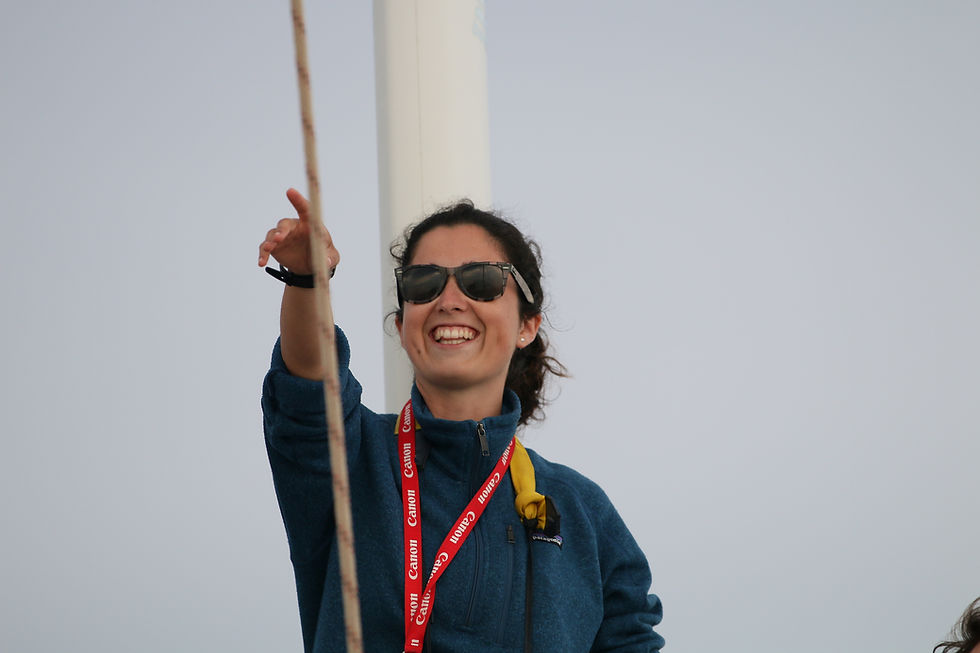
"I'm a master student at IMBRSea which stands for the International Master in Marine Biological Resources. It's an international master program where we get to go to a different university every semester.
Why did I choose to become a scientist? I never really knew what I wanted to do. I wanted to be a pirate. I wanted to be an explorer. I loved animals, the outdoors, so I guess marine biology was the next best thing. I really, really like exploring the outdoors, and in marine biology, I love the subject, but also the exploration and doing something good, trying to protect the ocean, reaching out, and communicating with people. I've always been a very restless kid, just in general, a very active person who maybe sometimes gets a bit bored of doing the same thing. So with marine sciences, I just love that you can do so much.
How can get to a more diverse equitable and inclusive scientific workspace? I really think it comes down to representation, it really does matter. It is important to show all kinds of people, lots of diversity, women, in science. I remember one of my first internships, I was doing this internship on a boat and the crew was all female. And for me it was, wow, it exists, it can happen! If you see it then you think it's possible, that you can do it too."
Kogie Govender, Science Engagement Coordinator at the South African Environmental Observation Network (SAEON) in South Africa.

"I am working in the science engagement program at the South African Environmental Observation Network, which is a business unit of the national research foundation. I spent my early childhood admiring the different use of the beautiful ocean and the ebb and flow of waves crashing against the rocks. I lived 200 metres away from the sea in a coastal town. We enjoyed the sea for recreational purposes, cultural activities, and as a source of food. My community and I were never exposed to any knowledge about ocean science or careers in marine sciences.
The most favourite thing about my work is that through our programmes, we are working and making a difference in the lives of people from socially, economically disadvantaged backgrounds and giving them opportunities to conduct research in a marine environment, thereby creating a new generation of marine scientists.
We encourage women, marine science researchers to co-design, co- engage, and co-deliver research so communities can make informed decisions. We also encourage businesses, NGOs and government agencies to support ocean literacy and marine science education programs so that we can inspire a new generation of women, ocean leaders, to promote sustainable management of our oceans."
Alienor Bourdais, operations officer at the Tara Ocean Foundation in France

"I'm currently working as an operation officer within Tara Ocean Foundation in Paris. I coordinate the logistics of the research unit Tara, which means that in every country I'm looking for an appropriate dock to dock the ship with electricity, water, visibility, and accessibility. So there are a lot of factors to be looking at. I'm also the focal point for all the people boarding Tara, the ship, the seamen, the scientists, the journalists, the artists.
Why did I choose to become an operation officer and work in this field? It's because I've always been interested in the maritime world and the people gravitating around it. I found that sometimes these people have a different perspective on the word, and it is pretty stimulating.
My favourite thing about my work is mainly the human relationship. The friendships that have created the adventure of their research, going on the field, going to different countries and meeting many people who actively work for the ocean. Conservation is very inspiring as well.
What is one piece of advice you would give to a younger woman about what they can do for the environment, for society? Women rights, equality, climate change are all huge and global society issues that we require for you to fight individually and collectively for your ideals. You should not question your radicality: It is relevant. It is appropriate, and it is normal to be angry sometimes when you feel you're not being heard and when you feel it's not moving fast enough."
Ana Noronha, Executive Director of Ciência Viva, the agency for scientific culture in Portugal.
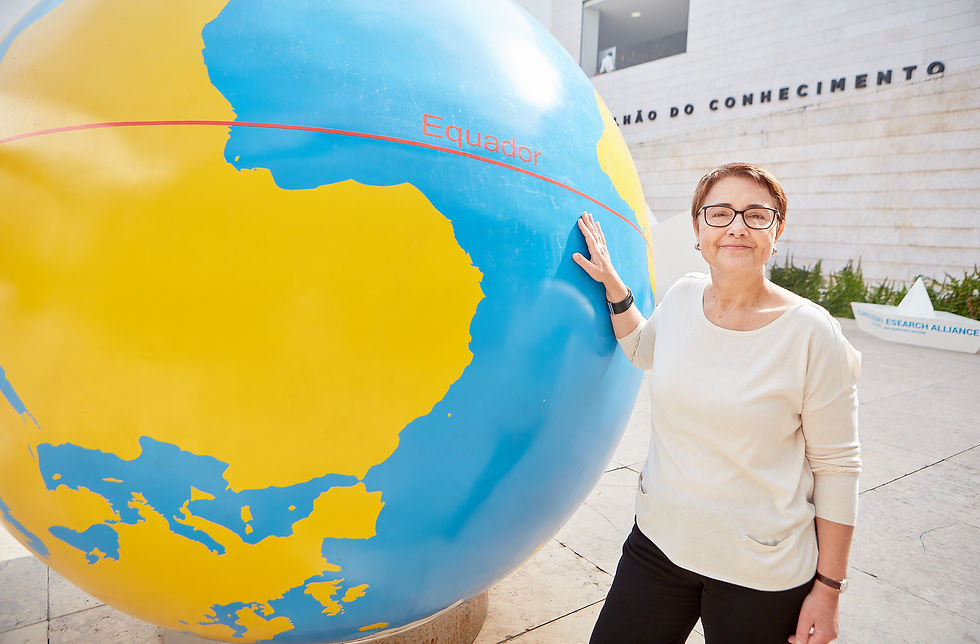
"I decided to be a scientist pretty soon because I have always been very curious. I was very curious when I looked at the things of nature, very inspired by the sky, by the ocean and everything that lives in it. So I was curious and at a certain point I decided to become a scientist. I started working in an institute and giving classes. Talking and communicating with others was really another passion that I discovered. In Portugal at a certain time, there was this initiative to promote scientific culture, Ciencia Viva, and I had a chance to be invited to be part of it. There, I have the privilege to satisfy my curiosity, if I am curious about something I can contact scientists, learn about it and then transmit it to other people.
As advice to a young person wanting to become a scientist, I would advise to never stop dreaming. To be assertive, but also to hear others, because science is also a social activity. It's done with colleagues and we have to learn to respect each other’s opinion, your teachers or supervisors, and also your colleagues. But be assertive and never stop dreaming."
Follow Ana on Twitter and LinkedIn, Follow Ciencia Viva on Twitter
Sieglinde Gruber, senior advisor to the European Commission

"I have been working in and for the European Commission for 30 years and prior to that, in Germany and Italy for the public and private sectors. So I am a retired Commission official. But I am and have become a friend of the passionates about the ocean, the health of the ocean.
Within that context I want to see how girls and women are active and are drivers of change for the future status of the ocean, so as to ensure that the ocean is healthy. According to figures I found, only 1.2% of the global seafarer workforce are women. Maybe one of the biggest reasons for these low figures is that women do not really know that the maritime sector can be very attractive with many available careers. And if we link that to the fact that nearly half of the current workforce will be eligible for retirement in the next 10 years, there has never been a better time for women to enter the maritime industry and the blue economy to change this demography and increase those percentages.
We know that the industry needs educated and trained employees who are up to date with the most current technology and management practices. And we also need to debunk some of the most commonly held myths about women not being right for traditionally male dominated professional occupations. It is very, very important to recognize that investment in women and girls in science is a process and not only a project with a starting point and an end.
How can we reach our full potential in society, business and politics as a whole if we do not use all our talents and diversity, because we only use for the moment half of our population, half of the energy, half of the power. And as the president Ursula von der Leyen said, that is not good enough. The statistics one sees that there is really an upward strength. So the situation is getting better even though a lot can still be done.
This is a message for the younger generation: never give up. The more women there are in these male dominated sectors, the better. Women rising to become leaders in the industries of the blue economy is essential to inspire future generations and show that nothing is off limits."

















































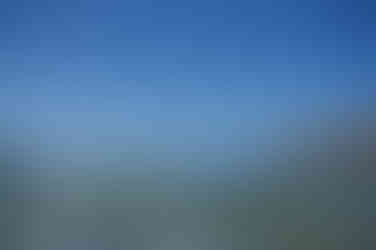









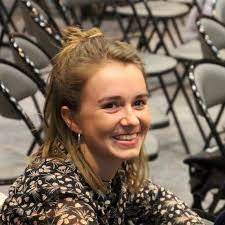
















Comments